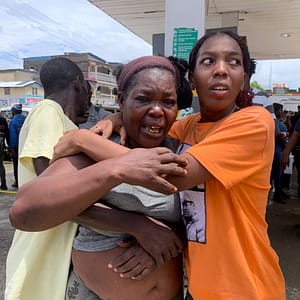P-to-P, April 17, 2024 [AlterPresse] — The Presidential Transitional Council would represent a signal of hope for Haiti, due to the fact that it is made up of different groups, “even if it is fragile”, analyzes the doctor of philosophy, Jean Waddimir Gustinvil, also director of the LAngages, DIScourses and REPresentations laboratory (Ladirep).
“It is a good sign that within a Council, the Montana group agrees to sit down with those who claim to be the Haitian Party shaved head (Phtk), because there is a country to save,” says Gustinvil on the show TiChezBabroadcast on AlterRadio 106.1 Fm and followed by AlterPresse.
“It is a shame” that other groups are not part of the Presidential Transitional Council, he regrets, while encouraging political protagonists to develop the culture of renunciation of hegemony, because this constitutes a dangerous practice.
Furthermore, several other sectors have declared their rejection of the Presidential Transitional Council, proposing the choice of a president from the Court of Cassation to lead the new transition.
On the evening of Tuesday April 16, 2024, the de facto government formally published the reproduced order appointing the 9 members of the Presidential Transitional Councilfrom various sectors and political parties, through the X account of the de facto prime minister’s office, after more than 24 hours of confusion around this appointment.
The decree, taken in the council of ministers, is initialed by the outgoing de facto prime minister, Ariel Henry, who is abroad, and the other members of the government.
According to article 1 of the decree, the Presidential Council includes the following seven voting members: Smith Augustin, Louis Gérald Gilles, Fritz Alphonse Jean, Edgard Leblanc fils, Laurent St Cyr, Emmanuel Vertilaire and Leslie Voltaire.
The two non-voting members (observers) are Régine Abraham and Frinel Joseph.
“To speed up the current process, it is necessary to appoint the members of the Presidential Transitional Council, with the responsibility for them to submit the required documents subsequently, within a reasonable time, and if they are unable to do so, they will be forced to resign,” specifies, in its decree, the resigning de facto government.
It becomes almost impossible to carry out a counter-verification, by the Council of Ministers, of the eligibility of the people designated by the different sectors, parties to the political consensus, explains the de facto government, as if to save face vis-à-vis suspicions of blocking the steps aimed at the installation of the Presidential Transitional Council.
Resolving the crisis requires awareness and collective commitment
To get Haiti out of this impasse, the political protagonists must first become aware of their failure. The crisis has reached such an extent that no sector could think of being able, on its own, to get Haiti out of this situation, considers Jean Waddimir Gustinvil.
Haiti needs the support of the international community, given the high level of crime on the national territory, he maintains.
Necessary conditions must be created for gangs to lay down their weapons and be judged, he demands, calling for armed gangs not to be considered political actors.
There are spaces like peristyles, Masonic lodges, hospitals, schools, churches, which should be untouchable in a society, even in times of war and in the event of revolution, underlines the doctor of philosophy.
“Schools should not be targeted during armed conflicts. We have no right to attack the future of young people. This is a limit that must not be crossed.”
Jean Waddimir Gustinvil denounces the criminal maneuvers of armed gangs, who even attack these symbols.
“Many schools are not accessible because violence is escalating around them. Children are killed, injured, raped, displaced and deprived of access to basic services, including school,” warned the representative of the United Nations Children’s Fund (UNICEF) in Haiti, the Belgian Bruno Maes. .
In addition to being terrorized and traumatized, an unknown number of children continue to be deprived of access to basic services, including school, UNICEF said.
Since Thursday, February 29, 2024, armed gangs have increased their violent attacks against various public and private buildings in the country, to maintain a climate of terror in the metropolitan area of Port-au-Prince.
83 private and public institutions and/or businesses were attacked, vandalized and/or set on fire in Port-au-Prince and neighboring communes, including 19 police stations and 5 peace courts and one (1) court of first instanceidentified the National Network for the Defense of Human Rights (Rnddh) in a report dated Wednesday April 10, 2024.
From January to March 2024, the United Nations recorded more than 1,500 people killed, while the Rnddh was able to count, for the same period, at least 208 dead, including 13 national police officers..
Professor Jean Waddimir Gustinvil, director of the LAngages, DIscours et REPrésentations laboratory (Ladirep), calls on the responsible authorities to ensure daily that the gaps between the different groups do not push society into the abyss.
“We are inside a society which produces inequality and exclusion. However, a political society being something fragile must produce the feeling of belonging. [mff emb rc apr 17/04/2024 11:50]








